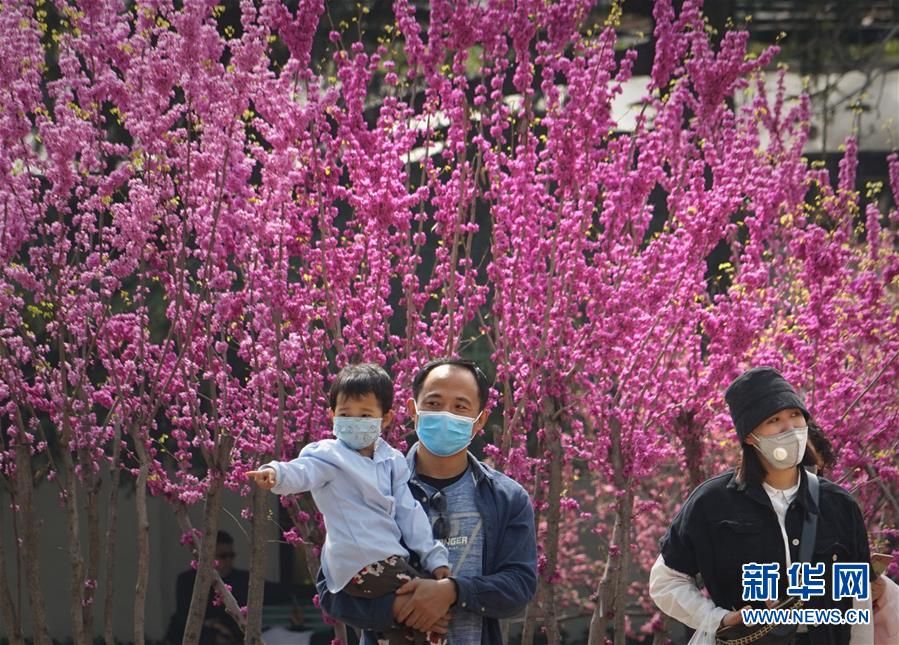

Local governments in China have introduced their plans to implement a 2.5-day weekend to stimulate consumption amid an economic downturn caused by the COVID-19 outbreak.

Citizens visit a park on weekend in Zhengzhou, Henan province. (Photo/Xinhua)
On March 19, east China’s Jiangxi province took the lead in trying this flexible work schedule in the second quarter, encouraging government officials and ordinary workers alike to go on vacations during the weekends. Authorities in east China’s Zhejiang province, north China’s Hebei province and Longnan city in northwest China’s Gansu province, followed suit and proposed to try out a 2.5-day weekend.
Such moves have raised heated discussions on Chinese social media. Experts noted that the 2.5-day weekend plan is a special policy for local governments to promote economic recovery, especially the tourism industry.
An estimate by the China Tourism Academy shows that domestic tourist arrivals are expected to decrease during the first quarter and the full year of 2020 by 56 percent and 15.5 percent respectively, while domestic tourist revenue will shrink by respectively 69 percent and 20.6 percent.
The number of days off work will contribute to residents’ tourism spending, said Wang Qiyan, director of China’s Leisure Economy Research Center under the Renmin University of China, adding that a longer weekend will help unleash consumption potential and relieve pressure on businesses.
Shen Jianfeng, director of the Law School of the China University of Labor Relations, echoed Wang’s remarks by saying, “The 2.5-day weekend plan is aimed at boosting tourism and leisure, letting workers share the benefits of economic and social development.”
This flexible work schedule may put pressure on enterprises or workers may face pay cuts, Shen noted, adding that not all workers and companies are willing to implement it, while also pointing out that a flexible plan should be based on the negotiation between employers and employees.
Compared to the 2.5-day weekend, some looked forward to thorough implementation of the paid leave system.
In some companies, even paid leave is unfeasible, said Zhao Zhong, a researcher with the National Academy of Development and Strategy under the Renmin University of China.
“For now, what we just have to do is implement the existing vacation system, including paid leave, the usual two-day weekend, and public holidays,” Shen noted.
Zhang Guangrui, honorary director of the Tourism Research Center at the Chinese Academy of Social Sciences, also said that conditions should be created to implement the paid leave system so that people become more willing to go on vacations.
 Fire brigade in Shanghai holds group wedding
Fire brigade in Shanghai holds group wedding Tourists enjoy ice sculptures in Datan Town, north China
Tourists enjoy ice sculptures in Datan Town, north China Sunset scenery of Dayan Pagoda in Xi'an
Sunset scenery of Dayan Pagoda in Xi'an Tourists have fun at scenic spot in Nanlong Town, NW China
Tourists have fun at scenic spot in Nanlong Town, NW China Harbin attracts tourists by making best use of ice in winter
Harbin attracts tourists by making best use of ice in winter In pics: FIS Alpine Ski Women's World Cup Slalom
In pics: FIS Alpine Ski Women's World Cup Slalom Black-necked cranes rest at reservoir in Lhunzhub County, Lhasa
Black-necked cranes rest at reservoir in Lhunzhub County, Lhasa China's FAST telescope will be available to foreign scientists in April
China's FAST telescope will be available to foreign scientists in April "She power" plays indispensable role in poverty alleviation
"She power" plays indispensable role in poverty alleviation Top 10 world news events of People's Daily in 2020
Top 10 world news events of People's Daily in 2020 Top 10 China news events of People's Daily in 2020
Top 10 China news events of People's Daily in 2020 Top 10 media buzzwords of 2020
Top 10 media buzzwords of 2020 Year-ender:10 major tourism stories of 2020
Year-ender:10 major tourism stories of 2020 No interference in Venezuelan issues
No interference in Venezuelan issues
 Biz prepares for trade spat
Biz prepares for trade spat
 Broadcasting Continent
Broadcasting Continent Australia wins Chinese CEOs as US loses
Australia wins Chinese CEOs as US loses